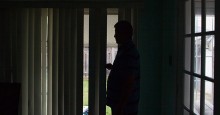Alex Gillis
In 2012, after Syria blocked media access to the horrors taking place in the war-torn country, Syrians, such as Ahmad EdilBi, whipped out their cell phones to post videos on social media about what was happening in their neighbourhoods. “These citizen journalists became vital in documenting human rights abuses and people’s protests,” EdilBi told a roomful of listeners at Living in the Digital Shadows of War, an event held at the Munk School of Global Affairs on October 25.
“We reported everything – every lie and line from the regime,” EdilBi said. “It was amazing. Social media was the only window into isolated cities.” Syrians collaborated online, creating a massive social network for three years, despite the regime arresting and torturing many of those posting criticisms. EdilBi eventually fled for his life but continued helping Syrians displaced by war, running his large NGO, Dubarah Network, which helps the Syrian diaspora and others to provide assistance to Syrian refugees.
His anecdote was one of many during the panel discussion, hosted by the Munk School and organized by OpenCanada.org, a digital publication that produces commentary and journalism on global issues and foreign policy. EdilBi and four other panelists described the digital shadows (the digital surveillance and risks) that follow people from repressive regimes. The panel agreed that in an age where dictators are experts in hacking and surveillance, everyone – not just activists – has to be careful when connecting online with colleagues and loved ones in repressive regimes.
As panelist Chris Tenove, a postdoctoral research fellow at the U of T’s Centre for Ethics and the Munk School, explained: “Debates over cyber security usually focus on threats to military assets, critical infrastructure and intellectual property, and ignore the individuals who might be at risk. Alienated young people are targeted for radicalization and recruitment. And people who simply want to communicate with loved ones in repressive states and conflict zones may find that these communications are sources of sorrow or danger rather than solace.”
Such dangers lie in our own backyards. Naheed Mustafa, another of the five panelists and a freelance writer and broadcaster, referred to a profile she wrote about Mariam Hamou, a stay-at-home mom in a quiet suburb in London, Ontario, who became a media director for a group opposed to the Syrian regime. Hamou had worked in the past for Canadian politicians and was a committed activist. Her new role involved reviewing images of dead children and Syrian atrocities in order to decide which photos would be appropriate for North American audiences. But after suffering from post-traumatic stress disorder from the images and getting hacked, she left the job, partly to protect the people who the hackers would endanger.
“The target isn’t always the target,” Mustafa explained. “The goal of the target is sometimes the target’s networks.” That’s why security forces take people’s cell phones, demand the passwords and hack into their social media accounts.
“Mariam also presented a different aspect of this vulnerability that we don’t talk about a lot,” Mustafa added. “This conflict is local but it’s also global. There are people around the world who are participating, day to day, minute to minute, who are not actually physically there.” These folks downplay their digital vulnerabilities however, even though, like Hamou, they and others are in danger.
The two other panelists, Amarnath Amarasingam (a fellow at George Washington University’s Program on Extremism) and David McDougall (a journalist and documentary maker who produced a series, Terror, for VICE), presented other digital vulnerabilities, such as how terrorist groups recruit young people in the West and the things that people should do to stay safe online.
All five panelists will present more of their work online, at OpenCanada.org, which launched the panel discussion as part of The War is Just a Click Away, a series about the intersection of cyber security and conflict.
November 7, 2016
